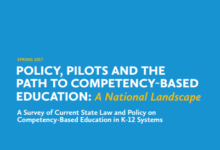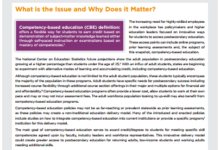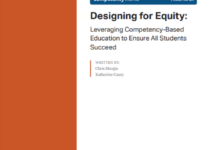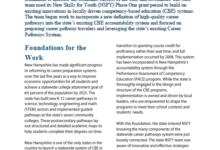New Hampshire began their transition to a statewide competency-based education and assessment system in 1998, when the Department of Education used federal School-to-Work funds to pilot competency-based programs in 27 high schools. While the state was already performing at higher academic levels than the national average, concerns from private sector leaders about the predicted skills gap and other projected challenges, spurred a conversation that led to the movement towards competency-based education. In 2001, the state began to use state local assessment funds to implement competency-based assessments in more high schools, and in 2003, opened the system to all grade levels. In 2005, the state formally scaled the competency-based system to all schools by updating the Minimum Standards for School Approval to require that every school award credit based on mastery of course content by 2008. The state most recently updated these Minimum Standards in 2014, which reaffirm the state’s commitment to competencies and offers a functional definition of ‘career technical education’ within a competency-based system.
Today, all New Hampshire schools operate on a competency-based system that awards student credit based on demonstrated mastery of knowledge and skills, rather than the Carnegie-based system, which awards student credit based on time spent in a classroom. The state has also framed their academic standards as competencies in English Language Arts, Math, Science, Arts, Social Studies and Work Study Practices. Districts can adopt the state model competencies or develop their own. The competency-based system uses extended learning opportunities and performance-based assessments to further develop students and their mastery of the competencies.
- Districts are given flexibility on the design of the assessments, but they generally consist of multi-step processes that take place throughout the year for students to work through and demonstrate critical thinking and mastery of a particular content area.
- Districts also have flexibility in the design and delivery of extended learning opportunities (ELOS, which are commonly work-based learning experiences), which can count towards a student’s graduation requirements, but the state has provided a number of resources and supports for ELOs and ELO coordinators
Policy in Action
During statewide implementation of the competency-based system, the Department of Education provided training to leaders and practitioners, with the schools who had been part of the original pilot supporting this effort by mentoring and guiding new schools in the method. The state has received recognition for its innovations, including receiving the 2012 Education Commission of the States’ Frank Newman Award for State Innovation.
Throughout implementation, the Department of Education heard feedback from teachers and students that identified two major challenges. The first was the time it took for teachers to review and plan the changes this brought to their teaching practice. The second was the turnover rate in school and district administration. Teachers reported that when principals or superintendents left, the reform effort was often put on pause until the new principal or superintendent was able to catch up. The state has named supporting teachers and the teacher and leader pipeline as major priorities moving forward in order to ameliorate both of these challenges.
Additionally, the state has begun to focus on shifting its accountability system and increasing buy-in for competency-based education in all aspects of K-12 education. After the passage of the Every Student Succeeds Act, New Hampshire made the choice to base its accountability system off the Performance Assessment of Competency Education (PACE) currently being piloted in eight school districts. Under PACE, students replace the summative Smarter Balanced assessment in certain years with performance-based assessments given throughout the year. In 2019 findings from a descriptive study suggested that there were small positive effects of the PACE pilot in all examined grades and subject areas as well as research showing that lower achieving students tended to exhibit small positive differential effects.
Related Links
- Report: New Hampshire Story of Transformation
- Website: New Hampshire’s Extended Learning Opportunity Resources
- Article: New Hampshire’s Journey toward Competency-Based Education
- Articles: Articles about the PACE pilot
- Research: Effects of New Hampshire’s Innovative Assessment and Accountability System on Student Achievement Outcomes After Three Years
Last updated: August 2021






